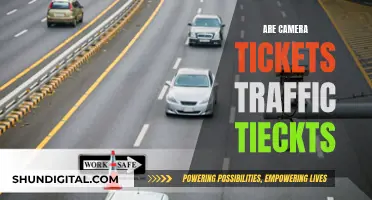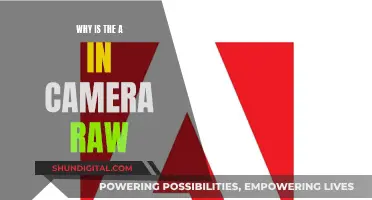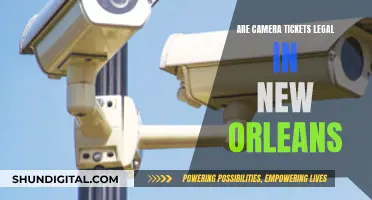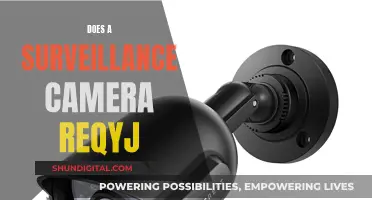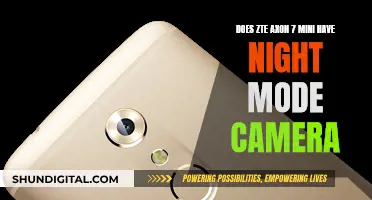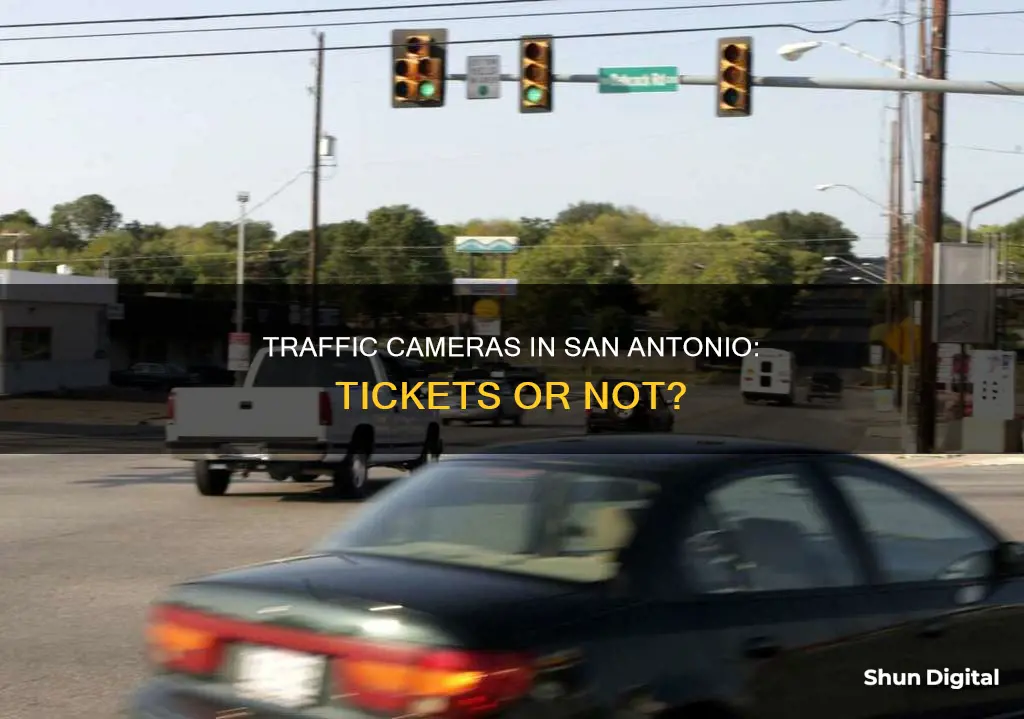
Red light cameras in San Antonio, Texas, are a controversial issue. While some argue that they promote traffic safety, others claim that they are nothing more than a revenue-generating scheme for smaller cities and towns. Despite a state law banning red light cameras passed in 2019, the cities of Leon Valley and Balcones Heights are still allowed to operate them due to existing contracts. These cameras have led to many drivers receiving tickets in the mail, causing confusion and frustration. While the tickets may seem intimidating, they are reportedly unenforceable and cannot affect driving records, vehicle registrations, or credit scores. However, this has not stopped the cities from continuing to issue them, and some drivers have chosen to pay the fines out of concern or convenience.
| Characteristics | Values |
|---|---|
| Location | San Antonio, Texas |
| Camera Type | Red light cameras |
| Ticket Enforcement | Not enforceable since 2019 |
| Ticket Payment | No repercussions for non-payment |
| Credit Score Impact | Cannot be reported to credit bureaus |
| Vehicle Registration | Cannot be refused due to unpaid tickets |
| Driver's License | Cannot be refused due to unpaid tickets |
| Collection Agency | Unpaid tickets can be reported to a collection agency |
| Safety | Cameras reduce crashes at intersections |
What You'll Learn

Are red light cameras in San Antonio legal?
Red light cameras in San Antonio have been the subject of much debate in recent years, with some arguing that they are an effective tool for improving road safety, while others claim they infringe on civil liberties and can even cause accidents.
In June 2019, Texas Governor Greg Abbott signed a bill into law that banned the use of red-light cameras across the state. This law came into effect on September 1 of that year. However, a provision in the law allows municipalities to finish their existing contracts, which has led to some cities, including two suburbs of San Antonio, keeping their red light cameras.
Balcones Heights and Leon Valley, the only two suburbs of San Antonio that use red light cameras, have extended their contracts with camera vendors to keep the cameras in place for years to come. The new contracts allow them to continue using the cameras for the length of the new agreements, which will expire in 2034 for Balcones Heights and 2038 for Leon Valley.
Despite the ban and the controversy surrounding red light cameras, these two cities argue that the cameras have improved road safety and reduced accidents. For example, Balcones Heights Mayor Suzanne de Leon stated that since the cameras were installed in 2007, traffic accidents at those intersections have fallen by 70%. Similarly, Leon Valley Police Chief Joseph Salvaggio reported a 43% drop in accidents and a 65% decrease in "angled crashes" after the cameras were installed.
In addition to safety improvements, the revenue generated from the red light cameras has allowed these cities to hire additional police officers and make improvements to traffic lights and signs. However, some residents and attorneys argue that the cameras are more about generating profit than improving safety, and that they can harm the city's reputation and impact businesses.
While the use of red light cameras in San Antonio is currently legal due to the existing contracts, it is unclear if the cities will be able to renew their contracts once they expire or if they will have to find alternative solutions to maintain road safety.
Charging Camera Batteries: USB Option for Photographers
You may want to see also

What happens if you don't pay a ticket?
In San Antonio, red light cameras are a contentious issue for many drivers, with some cities like Leon Valley and Balcones Heights still operating them despite a 2019 ban. While these tickets may be frustrating, it's important to understand the potential consequences of not paying them.
If you don't pay a ticket in San Antonio, the consequences can vary depending on the type of violation and the issuing authority. Here's what you need to know:
Increased Costs:
Failing to pay a traffic ticket will result in additional fees and penalties, significantly increasing the overall cost. The longer you ignore the ticket, the higher the fines and late payment fees will become.
Arrest and Warrants:
Not paying a traffic ticket can lead to more serious consequences than just financial penalties. Courts routinely issue warrants for individuals who fail to address their traffic violations. If you are pulled over or stopped while there is an outstanding warrant, you may be subject to immediate arrest and will have to go through the booking process at your local jail. Even after posting bail or being released, you will still need to deal with the original traffic violation and any associated fines or penalties.
Failure to Appear:
In addition to a warrant, the court may issue a Failure to Appear citation, resulting in additional fees and penalties.
Driver's License Renewal:
If you have an outstanding warrant or unpaid traffic ticket, you may be unable to renew your driver's license until the matter is resolved. This can cause significant disruptions, especially if your livelihood depends on your ability to drive.
Credit Score Impact:
While unpaid tickets generally cannot be reported to credit bureaus and do not directly affect your credit score, they can still impact your financial standing. If reported to a collection agency, the collection account may appear on your credit report and negatively impact your creditworthiness.
Insurance and Vehicle Registration:
Unpaid tickets, especially moving violations, can also affect your car insurance rates and your ability to register or renew your vehicle registration. Insurance companies may view you as a higher risk and increase your premiums. Additionally, certain jurisdictions may refuse to register your vehicle if you have outstanding tickets or warrants.
Parking Tickets:
While the consequences of unpaid parking tickets may not be as severe as those for traffic violations, they can still catch up with you. Unpaid parking tickets can be sent to collections, impacting your creditworthiness. Additionally, they may affect your ability to renew your driver's license or vehicle registration, especially if the issuing authority is a government entity.
In conclusion, while it may be tempting to ignore a ticket, doing so can lead to a range of negative consequences, from increased costs and legal issues to disruptions in your daily life. It is always best to address tickets promptly and seek legal advice if needed.
Don't Drain Your Camera Battery: Here's Why
You may want to see also

Can you be sent to collections for unpaid tickets?
In San Antonio, Texas, red light cameras are a contentious issue for many drivers. While the 2019 state law banned the use of red light cameras, the cities of Leon Valley and Balcones Heights are still allowed to operate them due to existing contracts. However, these cities are not authorised to use unpaid tickets against drivers when they renew their vehicles or licenses.
Regarding the impact of unpaid tickets on credit scores, it's important to understand the role of collection agencies and credit bureaus. Unpaid tickets can be reported to a collection agency, but they do not affect your credit score unless they are sent to one of the three major credit bureaus: Experian, TransUnion, or Equifax. These credit bureaus no longer include public record information on credit reports, except for bankruptcy. Therefore, while an unpaid ticket may end up with a collection agency, it will not directly affect your credit score unless it exceeds $100 and is reported to one of the major credit bureaus.
It is worth noting that while unpaid tickets may not immediately affect your credit score, they can still lead to other consequences. For example, depending on state and local laws, your driver's license could be suspended, you may face difficulties registering your car, or your vehicle could be booted, impounded, or even have a warrant issued for your arrest. Therefore, it is advisable to address unpaid tickets promptly and not ignore them, even if they are from red light cameras, which some consider unenforceable.
Kodak Camera Not Charging: Troubleshooting Guide
You may want to see also

How do red light cameras work?
In San Antonio, red light cameras are a contentious issue for drivers, with some cities still operating them despite a 2019 ban. While the cameras are still permitted in Balcones Heights and Leon Valley due to existing contracts, they cannot be used to prevent vehicle registration or license renewal if the ticket goes unpaid.
Red light cameras are automated enforcement systems that law enforcement uses to monitor intersections. They are typically positioned at the corners of an intersection, mounted on poles a few yards high, to capture a full view of any traffic violators. The cameras point inward to photograph vehicles driving through the intersection from different angles.
Red light cameras are synchronized with traffic signals and work in conjunction with sensors installed in the road. When a vehicle passes over the sensors at the stop line, the camera is triggered and takes several pictures of the vehicle, its license plate, and the driver, depending on the state. The vehicle's owner then receives a ticket in the mail, along with photographs and instructions for paying the fine or challenging the violation.
The purpose of red light cameras is to enforce traffic light laws and reduce crashes caused by running red lights. According to the Insurance Institute for Highway Safety, red light camera enforcement has led to a 21% reduction in fatal red light-running crash rates in large cities. However, the effectiveness of these cameras has been debated, and some states have banned their use.
Upgrading Camera Raw: A Quick Guide to the Latest Version
You may want to see also

Can you fight a ticket?
In San Antonio, cameras on top of traffic light poles are used as sensors to signal that a vehicle is waiting at the intersection for the light to turn green. This video is not recorded.
Red-light cameras are a different matter. While they are banned in Texas, the cities of Leon Valley and Balcones Heights are still allowed to operate them due to existing contracts. However, these tickets are not enforceable and cannot be held against you if you don't pay when it comes to renewing your vehicle or license. They also cannot be reported to a credit bureau.
If you receive a traffic ticket in San Antonio, you may be wondering if it's worth fighting it. More than 90% of drivers who receive a ticket simply pay the fine and move on. However, there are several reasons why you may want to consider fighting your ticket in court. Firstly, there is the fine associated with the ticket. While it may seem easier to just pay the fine and be done with it, it's important to consider the other potential costs of a traffic ticket. If you do not contest the ticket and it goes on your record, your car insurance premiums will likely increase. According to Bankrate.com, after a second traffic ticket, the average motorist's insurance premiums go up by 25%, resulting in an average loss of $700 over three years.
Additionally, paying a traffic ticket means accumulating points against your driving privileges. Under the Texas point system, motorists accrue various point totals for different kinds of moving violations. If you accumulate enough points, you can forfeit your driving privileges. Fighting your ticket in court is the only way to ensure you do not receive points on your license.
When deciding whether to fight a traffic ticket, it's also worth considering the potential time and cost involved. Government officials may not want to spend the time and resources on contested traffic tickets, especially if the officer who issued the ticket is too busy to show up in court. There may also be technical defences you can use, such as questioning whether the equipment used to clock your speed was properly calibrated.
If you decide to fight a traffic ticket in San Antonio, you can contact the Municipal Court at (210) 207-8970 or by email at sacourt@sanantonio.gov. You can also seek the advice of a traffic ticket defence attorney to explore your legal options.
The Evolution of Wyze Cameras: Battery or Plug-In?
You may want to see also
Frequently asked questions
No, red light cameras are illegal in Texas. However, there are a few exceptions in certain jurisdictions.
No, you don't have to pay a ticket from a red light camera. These tickets are not enforceable and cannot be held against you when renewing your vehicle or license.
If you don't pay a ticket from a red light camera, it may be sent to a collection agency, but it is not authorized to be reported to a credit bureau and cannot affect your credit score.
If you receive a ticket from a red light camera, you can choose to ignore it or throw it away. You can also contact a lawyer or your local city for more information.



